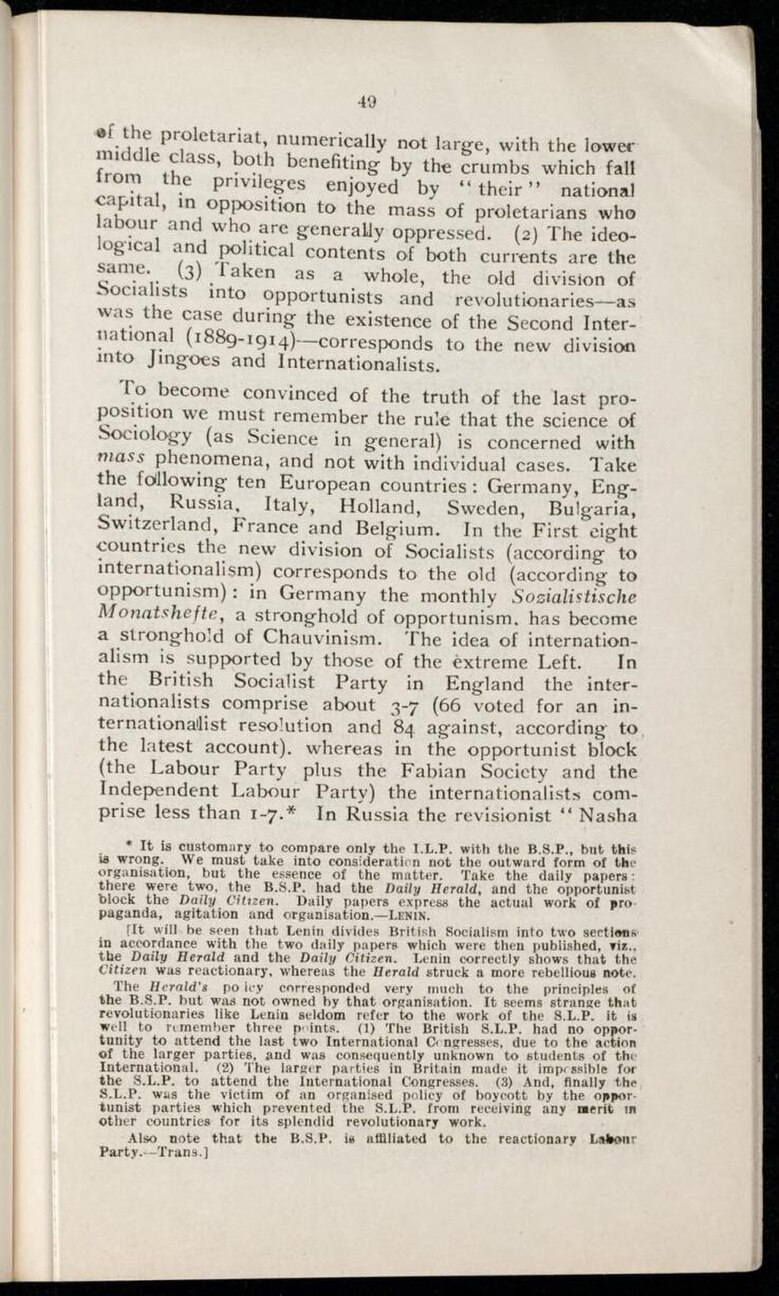49
of the proletariat, numerically not large, with the lower middle class, both benefiting by the crumbs which fall from the privileges enjoyed by "their" national capital, in opposition to the mass of proletarians who labour and who are generally oppressed. (2) The ideological and political contents of both currents are the same. (3) Taken as a whole, the old division of Socialists into opportunists and revolutionaries—as was the case during the existence of the Second International (1889–1914)—corresponds to the new division into Jingoes and Internationalists.
To become convinced of the truth of the last proposition we must remember the rule that the science of Sociology (as Science in general) is concerned with mass phenomena, and not with individual cases. Take the following ten European countries: Germany, England, Russia, Italy, Holland, Sweden, Bulgaria, Switzerland, France and Belgium. In the First eight countries the new division of Socialists (according to internationalism) corresponds to the old (according to opportunism): in Germany the monthly Sozialistische Monatshefte, a stronghold of opportunism, has become a stronghold of Chauvinism. The idea of internationalism is supported by those of the extreme Left. In the British Socialist Party in England the internationalists comprise about 3–7 (66 voted for an internationalist resolution and 84 against, according to the latest account). whereas in the opportunist block (the Labour Party plus the Fabian Society and the Independent Labour Party) the internationalists comprise less than 1–7.[1] In Russia the revisionist "Nasha
- ↑ It is customary to compare only the I.L.P. with the B.S.P., but this is wrong. We must take into consideration not the outward form of the organisation, but the essence of the matter. Take the daily papers: there were two, the B.S.P. had the Daily Herald, and the opportunist block the Daily Citizen. Daily papers express the actual work of propaganda, agitation and organisation.—Lenin.
[It will be seen that Lenin divides British Socialism into two sections in accordance with the two daily papers which were then published, viz., the Daily Herald and the Daily Citizen. Lenin correctly shows that the Citizen was reactionary, whereas the Herald struck a more rebellious note.
The Herald's policy corresponded very much to the principles of the B.S.P. but was not owned by that organisation. It seems strange that revolutionaries like Lenin seldom refer to the work of the S.L.P. it is well to remember three points. (1) The British S.L.P. had no opportunity to attend the last two International Congresses, due to the action of the larger parties, and was consequently unknown to students of the International. (2) The larger parties in Britain made it impossible for the S.L.P. to attend the International Congresses. (3) And, finally the S.L.P. was the victim of an organised policy of boycott by the opportunist parties which prevented the S.L.P. from receiving any merit in other countries for its splendid revolutionary work.
Also note that the B.S.P. is affiliated to the reactionary Labour Party.—Trans.]
